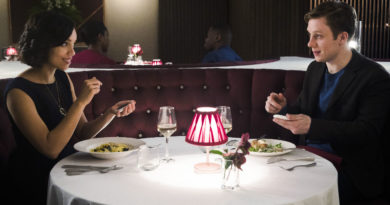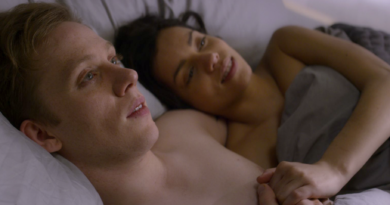Black Mirror Season 4 Review (Spoiler-Free)
Even by the usually minuscule British TV standards, Black Mirror was always a “small” show.
The two seasons of Charlie Brooker’s sci-fi anthology masterpiece that ran on England’s Channel 4 in 2011 and 2013 were three episodes each. That stretches the concept of how few episodes a TV series can feature before its even a TV series anymore and not a lose confederation of movies under one brand.
Still, the small episode order undoubtedly worked in the show’s favor. The “original six” of Black Mirror (The National Anthem. “15 Million Merits,” “The Entire History of You,” “Be Right Back,” “White Bear,” “The Waldo Moment”) amount to what is essentially a successful early 2010s film festival. Fans of the pre-Netflix Black Mirror could easily argue about the episodes amongst themselves, picking and choosing favorites as one would any of the (then) six Star Wars films.
Then, as tends to be the case on television: Netflix happened. Black Mirror set the streamers’ servers ablaze and led to Reed Hastings’ boyz picking up the show for two new seasons. Each one would be double the size of the original seasons at six episodes a pop. When 2014’s Christmas special “White Christmas” is taken into account, Netflix and Charlie Brooker have now more than doubled the original output of Black Mirror in under two years.
Each new episode of Black Mirror runs the risk of saturating the modern sci-fi Twilight Zone parables market that it, itself, has cornered. Can the six new episodes in Netflix’s Black Mirror season 4 (the release date will soon be announced) maintain the energy of the original six without diluting the Black Mirror gene pool?
Of course, you hypothetical straw man dummy. Black Mirror remains as essential a viewing experience in season four as it ever has thanks to yet another strong round of human-oriented science fiction storytelling.
In season four, Black Mirror fully embraces its Twilight Zone legacy and becomes the show bite-sized, insanely watchable, and at times humorously dark parables that Rod Sterling’s hour always was. The Twilight Zone to Black Mirror comparison has always been one of pop culture’s easiest analogies but now more than ever it feels earned.
Both shows are anthologies, engage in some dark humor and can easily be summed up at episode’s end by some J. Walter Weatherman with an easy “and that’s why…” message. In season 4, however, Black Mirror re-embraces its sense of humor and the macabre. The show that began with the Prime Minister fucking a pig now embraces that dark and at times satirical spirit in every go-around.
The order of the episodes supposedly doesn’t matter. Brooker told us prior to season three that the episodes could be viewed in any order like a “film festival.” Season 4 seems to operate under a similar principal. Still, an order has been selected and therefore must be significant in someway. Just like every mixtape or burned CD you’ve ever made.
Season four opens up with “Crocodile” which is easily the bleakest and most violent of the offerings. “Crocodile” deals with accessing memories in a way very similar to “The Entire History of You.” While “History of You” utilized the sci-fi concept for a sci-fi drama, “Crocodile” goes more of a true crime route. Watching even just the first five minutes of “Crocodile” it’s hard not to empathize with viewers who come to the show via season three Emmy-winning standout “San Junipero.” “Where’s the happy interracial lesbian couple from the ‘80s? And where is there so much blood onscreen?”
The season’s second hour “Arkangel” starts strong and is directed with Rust Belt flourish from Jodie Foster. “Arkangel” deals with relationship between parent and child and for 3/4 of its running time is an unsettling, yet elegiac story before going wrong in the third act.
The fourth season really hits its stride with episode 3 “Hang the DJ” and maintains the momentum through to the very end of episode 6 “Black Museum.” “Hang the DJ” is the closest this season comes to a “San Junipero” type hour. It’s a love story set in a world in which an online dating app more or less tells you who to date and for how long. It brings just the right amount of mystery and intrigue to the table to go along with likable performances from its leads Georgina Campbell (Broadchurch) and Joe Cole (Green Room)
“USS Callister” is the season’s standout episode. It’s among the longest Black Mirror episodes ever and each second with it is time well spent. It certainly helps that it’s the installment that brings the most acting star power to the table with some TV royalty like Jesse Plemons (Friday Night Lights, Breaking Bad), Jimmi Simpson (Westworld, It’s Always Sunny in Philadelphia), and Christin Milloti (How I Met Your Mother).
Brooker follows up the longest episode with the season with the shortest (and maybe its second best) with “Metalhead.” Brooker has compared the 40-minute, black-and-white thriller to the season’s “2-minute punk track” and it’s an apt comparison. The episode feels entirely experiential with very few obvious themes or lessons to be gleaned. “Metalhead” more than any other episode this season shows the most potential for the continued growth and maturation of the series. It’s like witnessing an artist learn “less is more” in real time.
Since “Metalhead” is so wildly atypical, season 4 finishes things off with the most Black Mirror-y episode of the bunch in “Black Museum.” “Black Museum” openly embraces fan service in a way that few episodes of ever have. Prepared yourself for Easter Eggs.
“Black Museum” falls into a similar trap as “Crocodile,” and “Arkangel” when calibrating what level of darkness and despair is appropriate for any given moment. There are also some moments that will generate much-deserved think pieces. Still the stories within are fun enough to make it the season’s third or fourth best episode.
Season four does indeed bring a lot to the table. There may not be a single episode as revelatory as “San Junipero” (“USS Callister” and “Metalhead” come the closest) but the experience as a whole is more consistent. In fact, this is the first collective batch of Black Mirror episodes that frequently reuse themes and technologies. The effect makes the “film festival” feel like more of a TV show than ever before. In a good way.
The era of early adopters obsessing over a handful of episodes of Black Mirror was fun but don’t fear the upcoming inevitable era of mass acceptance of the Black Mirror formula.
The episode count for the entirety of Black Mirror has now run to 19, which means the “rank every episode of Black Mirror lists”* will become more unwieldily than the original cleanly defined six. Based on the quality of season 4’s output, however, don’t panic. Make your 19 episode list. May it one day reach 31, then 43, 866, infinity.
*Look out for ours coming soon.
For as terrified as we rightfully are of the limitless technological expansions on the horizon, we should be just as excited for the Black Mirror morality plays that will accompany them. These episodes have been exactly that, after all: morality plays. Parables. They’re short, exciting, symbolic stories designed to entertain and enlighten. Why explain something to someone when you could tell them a story? Jesus got to tell 70 of them. The Twilight Zone got to tell 156. Here’s hoping that Brooker has a lot more in him.
Black Mirror season 4 arrives on Dec. 29 on Netflix.


